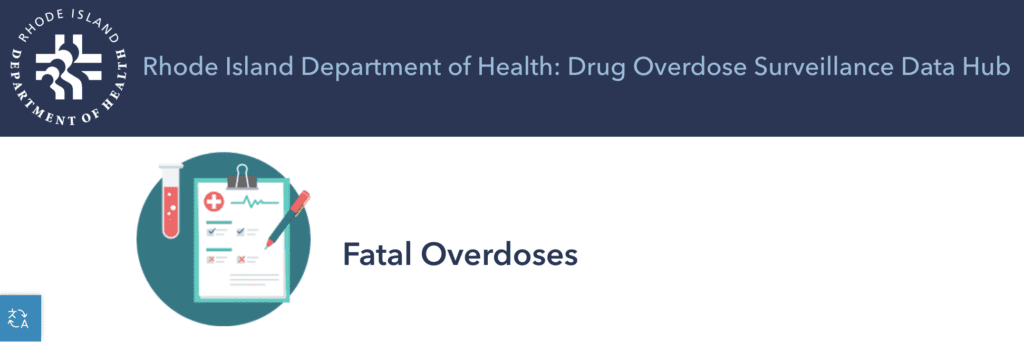Search Posts
Recent Posts
- Rhode Island Weather for June 18, 2025 – Jack Donnelly June 18, 2025
- Johnson & Wales University names Joseph Greene, Providence campus president, to lead major new initiatives June 18, 2025
- To Do in RI: Hospitality employees and Newport Co. residents welcome at free Newport attractions June 18, 2025
- Time for Sour Grapes – June 18, 2025 – with Tim Jones June 18, 2025
- It is what it is: Commentary, 6.18.25 – with Jen Brien June 18, 2025
Categories
Subscribe!
Thanks for subscribing! Please check your email for further instructions.

RI overdose deaths down 7.3%, first decrease in 4 years, mindful of 68% increase from 10 years ago
Good news in overdose deaths? While it hasn’t seem quite the time for good news of almost any kind, Rhode Island has good news to share. Governor Dan McKee and the leadership of the Governor’s Overdose Task Force announced today a 7.3% decrease in overdose deaths in Rhode Island in 2023, the first decrease seen in the state in four years. In 2023, 404 people lost their lives to accidental overdoses in Rhode Island, compared to 436 people who lost their lives to overdoses in 2022.
Even though this is a positive trend, when compared to 10 years ago, the lowest recorded deaths in RI due to overdose, that number was 240 – leaving 2024 with 164 more deaths, an approx. 68% increase.
“While we have a lot more work to do, today’s announcement offers some encouragement for us as we move forward with our work to prevent overdoses and save lives,” said Governor Dan McKee. “We have many new interventions in place to respond to the dynamic nature of this crisis. We have to keep innovating and collaborating with our partners in the community to continue preventing overdoses. My heart breaks for each and every person who has lost a loved one to this epidemic. We owe it to the Rhode Islanders who have passed, and to their families, to do everything possible to prevent any additional overdose deaths.”
In a release sent out by the Rhode Island Department of Health: “This decrease between 2022 and 2023 was supported by a whole-of-government approach and the work of community organizations, healthcare professionals, and people at the local level. Coordinated by the Governor’s Overdose Task Force, Rhode Island’s overdose response is built around the pillars of prevention, rescue and harm reduction, treatment, and recovery. The Task Force works to ensure racial equity is embedded across all work, improve lives and uplift community voices, use data to drive change and build connections to care and address the root causes of addiction and social determinants of health.”
“Although we have momentum and are moving in the right direction, it is important to remember that each and every number is a tremendous loss for families, friends, and loved ones,” said Tommy Joyce, Community Co-Chair of the Overdose Task Force. “There is more work to be done but by continuing to work across our state agencies and with our community stakeholders. Collaboration is the key to making the impact we seek in reducing fatalities. Our goal is to strategically align our efforts across the continuum of care targeting communities that are disproportionately impacted across the lifespan, including youth.”
“Today, we acknowledge that our strategy to reduce overdose deaths statewide is making an impact, while knowing there is still much more to be done,” said EOHHS Assistant Secretary Ana Novais. “All Rhode Island communities lost someone to an overdose. These are our family members, neighbors, friends and colleagues. We mourn them while continuing to move forward in the hopes of saving more lives.”
“We are working in every city and town in Rhode Island to make life-saving resources available in the areas of prevention, treatment, harm reduction, rescue, and recovery,” said Director of Health Jerry Larkin, MD. “Every single overdose death is preventable. Recovery is within reach for every person living with the disease of addiction. We need to keep coming together as families, as communities, and as a state to continue reducing the number of drug overdose deaths in Rhode Island.”
“There were fewer lives lost, and that has always been our goal, however there is still work to be done,” said Richard Leclerc, Director of the Department of Behavioral Healthcare, Developmental Disabilities & Hospitals and a co-chair of the Governor’s Overdose Prevention and Intervention Task Force. “The needle is moving in the right direction, but we must continue to build upon our multi-faceted approach to save lives because we know that addiction is a disease and recovery is possible.”

Data overview
Fatal drug overdose data in Rhode Island are generated using results from RIDOH’s Office of State Medical Examiners and State Health Laboratories. Because of the complex toxicology testing required for many cases, it can take several months to finalize the year’s fatal overdose data.
- The municipalities with the highest rates of fatal overdoses were Woonsocket (67.4 overdose deaths per 100,000 people), Providence (53.3 per 100,000), Pawtucket (46.6 per 100,000), East Providence (31.9 per 100,000), Cranston (31.5 per 100,000), and Warwick (24.1 per 100,000). (Rates are only calculated for municipalities with 15 or more fatal overdoses occurring in 2023.)
- Opioids and fentanyl continue to drive the overdose epidemic in Rhode Island. In 2023, 85% of overdoses involved any opioid (including fentanyl), while 78% involved fentanyl.
- More than half (58%) of fatal overdoses involved cocaine. (When a fatal overdose involved cocaine and another substance, such as fentanyl, it is unclear whether the polysubstance use was intentional or if that person unknowingly used cocaine and another substance.)
- In 2023, the rate of fatal overdoses decreased by 11% among Black (non-Hispanic) and 15% among Hispanic or Latino Rhode Islanders. The rate among white (non-Hispanic) Rhode Islanders remained similar to previous years. However, the overdose rate among Black (non-Hispanic) Rhode Islanders still remains higher than that of white Rhode Islanders.
- Most people who died from a drug overdose were male (69%).
- Most overdoses were seen amongst Rhode Islanders from age 24 to 55. Rhode Islanders aged 35 to 44 saw the greatest increase in overdose deaths in 2023 (73.9 per 100,000).
- Eight in 10 overdose deaths took place in private settings.
- This was the first decrease in overdose deaths since 2018-2019. In 2018, 314 people died of overdose deaths, compared to 308 in 2019.
- Nationally, overdose deaths decreased by 3% between 2022 and 2023.
Governor’s Overdose Task Force
The 2023 year-end fatal overdose data were presented during the monthly meeting of Governor McKee’s Overdose Task Force today. The Task Force is the center of all drug overdose prevention and intervention activities in the state. Its work entails targeted prevention efforts in schools and the community, harm reduction and rescue education, expanding access to treatment, and providing wrap-around services for individuals, families, and pregnant people.
A comprehensive list of overdose prevention interventions is available online. Some sample initiatives include:
- In 2022, Rhode Island joined the national opioid settlement with three major opioid distributors, providing over $90 million in funding for State and local efforts to address Rhode Island’s opioid crisis. These settlement funds were secured through the work of Rhode Island’s Attorney General Peter F. Neronha. To date, funding has gone to support efforts focused on racial equity, emerging issues, data, social determinants of health, prevention, harm reduction/rescue, treatment, and recovery. Since 2020, Attorney General Neronha has reached settlements with opioid manufacturers, distributors, and the consultants advising those companies, that have brought and will bring more than $330 million in cash and lifesaving medication to the state.
- RIDOH continues to deploy a targeted overdose prevention text message campaign to Rhode Islanders living in overdose hot spots.
- The State is continuing to do public education on the risks of fentanyl, xylazine, and stimulants, and how to connect people to free harm reduction resources.
- BHDDH supports a community mobile treatment and outreach unit through the CODAC mobile unit. Through this unit, harm reduction organizations (AIDS Care Ocean State, Community Care Alliance, Parent Support Network, and Project Weber/RENEW) send teams to overdose hot spots and connect people with harm reduction resources (safe injection kits, condoms, fentanyl test strips, naloxone, safer smoking kits, wound care kits), and treatment and recovery support services.
- EOHHS has contracted with Project Weber/RENEW to open a state-regulated overdose prevention center in 2024. The center will be a place for people to have access to comprehensive services and to use pre-obtained drugs under the supervision of medical professionals and trained staff.
- BHDDH added 44 total beds between two different residential treatment facilities. These beds have served 152 people since the Summer of 2023.
- RIDOH has established centralized naloxone supply hubs for community-based organizations to access free naloxone. In 2023, 49,808 naloxone kits were distributed, a 36% increase compared to 2022.
Resources for Support, Treatment, and Recovery
Rhode Island’s overdose resource website, PreventOverdoseRI.org, offers information on local treatment, recovery, and harm reduction services. The following 24/7 resources are available for Rhode Islanders who need immediate help for substance use conditions.
- People can call or text 988 or chat 988lifeline.org to connect with a trained crisis counselor through the 988 Suicide & Crisis Lifeline. Additionally, BH Link, located at 975 Waterman Ave., East Providence, offers community-based, walk-in services for immediate, stabilizing emergency behavioral health services.
- People can call Rhode Island’s Buprenorphine Hotline (401-606-5456) to access telehealth services for the initiation of buprenorphine treatment for opioid use disorder.
- For children and youth younger than age 18, people can call the Kids’ Link Hotline at 1-855-543-5465. Kids’ Link RI triages and refers children and youth to behavioral health and treatment services.
- RIDOH’s Substance Use Epidemiology Program manages a publicly accessible Drug Overdose Data Hub providing municipal, county, and statewide data trends. These data are aggregated by race and ethnicity, or broken down by subcategories or groups, to improve quality and completeness.
- BHDDH contracts with the Substance Use and Mental Health Leadership Council of RI (SUMHLC) to offer comprehensive community-based mental health and substance use training to support workforce development. Anyone interested in working in the Behavioral Healthcare field can participate in either live or on-line training webinars at low costs.
How you can save a life
- Learn the signs of an overdose, such as slow, shallow breathing; gurgling noises; or breathing that has stopped; unconsciousness/unresponsiveness, or skin tone that appears grayish or ashen to bluish-purple.
- Call 911 first if someone is overdosing. The Rhode Island Good Samaritan Law provides certain legal protection when you call 911 when someone is overdosing, whether you have drugs on you or not.
- Carry the overdose reversal medicine naloxone (sometimes called Narcan) and know how to use it. Naloxone is available at pharmacies without a prescription, community-based organizations, and select retailers. You can also get free mail-order naloxone at preventoverdoseri.org/naloxone.
